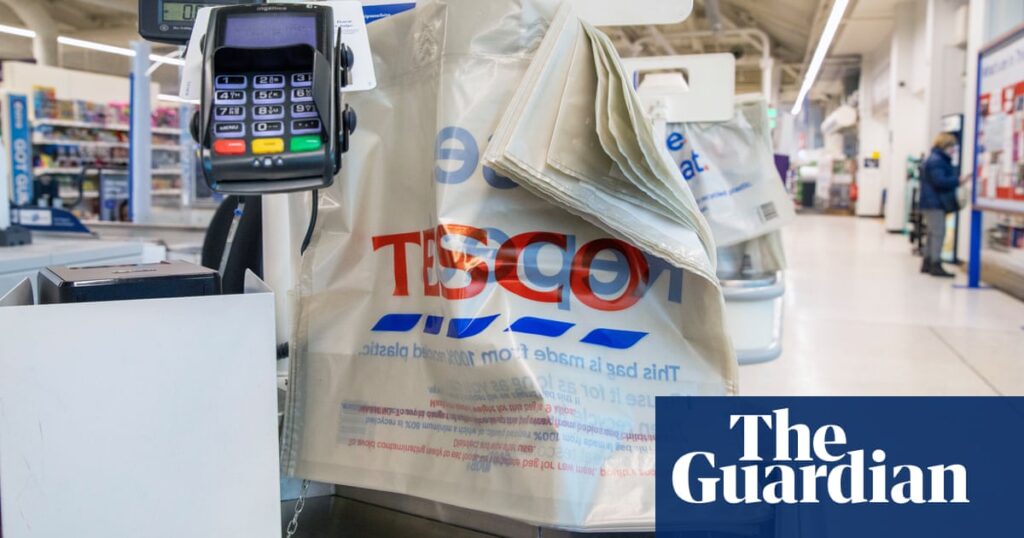Charities attack Tesco rules for evening-only collection of unwanted food | Tesco

Tesco is facing criticism from “shocked” charities who say they are struggling to distribute unwanted food to homeless and hungry people after they claim the retailer brought in rules that mean unwanted food can only be collected in the evening.
The supermarket group has switched to a new system which asks charities to pick up unwanted food, such as items reaching their best before date, only in the evening when a store is closing rather than the following morning, the charities have claimed.
Seven local groups, including Food for Charities in Oxford, Abingdon Community Fridge and the Zero Carbon Guildford Community Fridge, have written to Tesco warning that surplus food is no longer going to the people who need it the most, leaving some groups now buying food instead to distribute to homeless people. They have also launched a petition calling on Tesco to rescind the changes.
“Most of us struggle to find volunteers to pick up in the evenings. Most of our charities do not have recipients for ‘evening food’ such as meat and sandwiches because we close our doors before the Tesco food is available,” the letter from charities to Tesco says.
“We do not have room for freezers, or our freezers are located in community facilities that are locked in the evening, or we do not feel happy sending lone volunteers into a building to put food in a freezer.”
Some charities also reported that a system under which they had a period of time to get “first dibs’” on Sunday collection slots had now been altered so that they claimed they were in competition with users of the Olio food waste app, which could include well-off families, to grab slots first.
In a separate email seen by the Guardian, a regional representative from the charity FareShare, which oversees the waste collection process in Tesco stores, said the retailer had made the “estate wide change” after testing different methods at some stores over the last few years.
“Tesco have made the decision to change the donation time at almost
all Tesco stores across the country, from the morning to the evening,” the email reads
It said the changes had been made so that Tesco could donate chilled food alongside longer-life items such as baked goods, fruit and vegetables and this was not possible with morning collections. Chilled items tend to have a ‘use by’ date which means they could be unsafe if consumed the next day.
Tesco denied it had made widespread changes, saying it had always encouraged the 2,700 local charities which collect food from its stores to pick up in the evening rather than the morning. It said there was no difference in Sunday collections to any other day of the week.
Riki Therivel, director of Food for Charities which runs a number of community fridges in Oxford, said her group had not received any warning about the change which now meant it had to spend about £50 a week on buying food.
She said the amount of food available for its community fridge system, which feeds hundreds of people, had also halved. “It’s a big shock for us and an increased expense.
“We can’t pick up in the evening so we will be getting less food in future,” she said. “It is difficult for charities to pivot.”
Farrah Rainfly, operations manager at Lifeafterhummus, a north London charity which redistributes food , said she was angry that the changes had been made with “no discussions”.
after newsletter promotion
“It really is putting profits before people,” she said. “Treating people in need of food like garbage disposal.”
A spokesperson for the supermarket said: “We work hard to prevent food from going to waste and donate millions of unsold meals from our stores to local charities and community groups each month.
“We’ll always prioritise local charities to receive food from FareShare, but, if they are not able to collect the food, we offer it to other local groups or distribute it to the local community for free via the food waste app Olio to prevent good food from going to waste.”
Olio said charities had priority in receiving collection slots.
A FareShare spokesperson said that it was connected directly to 20 Tesco distribution centres helping it to provide food to thousands of charities across the country and the end of day surplus distribution from stores was in addition to that system.
“Tesco has been instrumental in supporting FareShare’s mission to combat the environmental impact of food waste, ensuring good food goes to people, not waste,” the group said.
The dispute with charities comes after Tesco found that thousands of tonnes of unwanted food it thought was going to feed animals had instead been used to generate energy, dramatically damaging its progress on reducing food waste.
Source: theguardian.com

